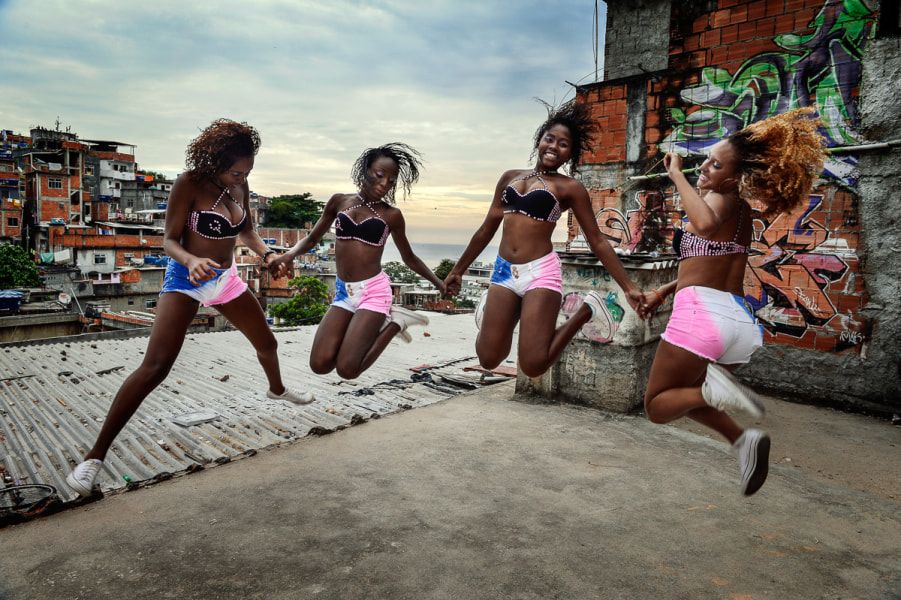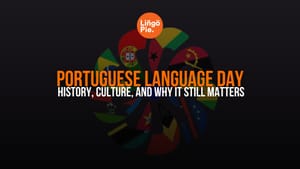In the colorful world of Brazilian music, Portuguese Learners might find that exists a pulsating beat that echoes the rhythm and soul of Brazil's urban culture: Brazilian Funk.
This genre, often referred to as Funk Carioca, has captivated audiences both domestically and internationally with its infectious energy and unique sound.
From the bustling streets of Rio de Janeiro to the vibrant clubs of São Paulo, Brazilian Funk has become synonymous with the urban experience, offering a glimpse into the heart of Brazilian music.

The Evolution of Brazilian Music
Brazilian music has a rich and diverse history, influenced by a myriad of cultural and musical traditions.
From the rhythmic beats of Afro-Brazilian instrumental music to the smooth melodies of bossa nova, Brazilian music developed and evolved, reflecting the dynamic nature of the country's cultural landscape.
One of the most notable developments in Brazilian music is the emergence of Funk Carioca, also known simply as Brazilian Funk.
This musical style originated in the favelas of Rio de Janeiro in the late 20th century and quickly gained popularity among the city's youth.
The Rise of Funk Carioca

Funk carioca, also known as favela funk or baile funk, emerged as a hip-hop subgenre from Brazil in the late 1970s.
Drawing from a diverse range of international music styles such as gangsta rap, Miami bass, Afrobeat, samba, as well as electronic subgenres like electro and freestyle, along with traditional African and Brazilian folk and religious music, skilled DJs intricately blended these influences into relentlessly percussive tracks.
This dance music served as an outlet for residents of favelas, the marginalized neighborhoods of Rio de Janeiro, Brazil's second-largest city.
In the 2000s, the funk carioca scene gained global recognition, owing partly to its unmistakable Afro-Brazilian rhythms and lyrics that embraced excess.
During this period, non-Brazilian artists like M.I.A. briefly adopted funk carioca, while a new wave of homegrown funkeiros, or funk carioca artists, emerged, producing various spin-offs and hybrid subgenres. Despite facing significant opposition from the Brazilian government and law enforcement, funk carioca maintained its popularity.
Although both genres include "funk" in their name, funk carioca bears no resemblance to traditional funk music, which is characterized by funky, syncopated bass lines and steady, infectious drum grooves.
A Journey through the History and Culture of Funk Carioca
Originating in the favelas of Rio de Janeiro, where DJs spun records at lively outdoor gatherings known as funk parties, funk carioca quickly became a powerful cultural force, providing a release for residents living in these underprivileged neighborhoods.
The birth of the sound
In its early days, funk carioca was characterized by DJs playing US soul, R&B, and funk tracks at funk parties. However, as the genre evolved, Miami bass and freestyle music replaced these influences, shaping the distinctive sound of funk carioca.
One of the pivotal moments in the genre's history occurred with the release of the album "Funk Brasil" in 1989, featuring Portuguese-language versions of Miami bass and freestyle tracks, which marked the beginning of Brazil's funk scene.
Throughout the 1990s, funk carioca gained traction with nationally successful releases, such as MC Batata's single "Feira de acari" and the compilation series "Rap Brasil."
While many early funk carioca songs celebrated carefree fun, others, like "Rap da Felicidade" by Cidinho & Doca and DJ Marlboro, addressed the realities of life in the favelas, including the rise of drug-related violence. By the early 2000s, the raw and explicit subgenre known as "funk proibidão" had propelled funk carioca into the mainstream, attracting a diverse audience.
The international appeal of funk carioca
With the advent of the internet, funk carioca's influence spread beyond Brazil's borders, particularly to Europe, where collaborations between Brazilian artists and expatriates gained popularity.
Artists like Deize Tigrona and São Paulo expats Tetine found success with their fusion of funk carioca and other musical styles. Additionally, international artists like M.I.A. and DJ Diplo helped to introduce funk carioca to a global audience with releases inspired by the genre.
Characteristics
Funk carioca is characterized by mature lyrics, addressing themes ranging from partying to social and political issues relevant to listeners. While some songs focus on the beauty of Rio de Janeiro or community pride in the favelas, others, like "Rap da Rocinha" by MC Neném, highlight the challenges faced by residents, including police violence and drug-related crime.
Notable Artists
Over the years, funk carioca has produced a multitude of talented artists who have made significant contributions to the genre.
Anitta, Bonde do Tigrão, Gaiola das Popozudas, Ludmilla, and Tati Quebra Barraco are just a few examples of artists who have achieved success with their innovative and influential music.
The Diverse Sounds of Brazil

The country's musical scene offers unique and original styles. Here is a brief overview of some of them:
Forró, originating from the arid interior of Northeast Brazil known as the sertão, represents the essence of the region, blending African, Portuguese, and indigenous influences into a distinctively Brazilian sound.
Maracatú, a vibrant dance and music tradition, is celebrated during carnivals, particularly in Fortaleza, with its Baque Virado or Nação lines adding to the spectacle.
Axe music, originating from Bahia, combines Afro-Brazilian rhythms with pop sensibilities, creating an infectious and lively style.
Ciranda, originating from Pernambuco, and coco, an Afro-Brazilian song and dance style, highlight the diversity of northeastern Brazil.
Samba and Bossa Nova
Samba has garnered widespread recognition as the quintessential Brazilian music genre on the global stage, particularly owing to the country's vibrant carnival celebrations.
Meanwhile, bossa nova, has also garnered significant international acclaim since the 1950s, one of the most acclaimed composers being Antônio Carlos Jobim.
Brazilian rock
The evolution of Brazilian rock spans from its roots in the 1950s with artists like Nora Ney, to the emergence of the Jovem Guarda movement and experimental bands like Os Mutantes in the 1960s.
The genre continued to diversify through the 1970s with the rise of progressive rock bands and the onset of the Brazilian punk rock scene, leading to a commercial boom in the 1980s with bands like Legião Urbana and festivals such as Rock in Rio, followed by the growth of indie movements in the 1990s and 2000s, although international success has been limited.
Brazilian electronic music
Brazilian electronic music emerged in the 1980s, coinciding with the genre's global rise in popularity.
Throughout the 1990s, electronic music gained momentum both in Brazil and internationally, with DJs like DJ Marky and DJ Patife gaining prominence. By the 2000s, dubstep began to gain traction in Brazil.
Today, Brazil boasts a plethora of renowned electronic music artists, including Alok, Kasino, and Vintage Culture.
Each of these genres contributes to the rich tapestry and popularity of Brazilian music worldwide, reflecting the country's unique heritage and vibrant artistic expression. They also offer a wealth of resources for language learners to explore, with beats and lyrics that convey the unique flavor of Brazilian Portuguese.
FAQs
Here are also some of the most frequently asked questions about Brazil's unique and original styles of music
What is the funk culture in Brazil?
The funk culture in Brazil, particularly Funk Carioca, is a dynamic and vibrant musical movement deeply rooted in the urban landscape of the country.
Originating in the favelas of Rio de Janeiro in the late 1970s, funk carioca has become synonymous with energetic rhythms, infectious beats, and raw lyrics that reflect the experiences of marginalized communities. It serves as a voice for social issues and a form of expression for those living in underprivileged neighborhoods.
Why is funk illegal in Brazil?
Funk music, particularly funk carioca, has faced opposition and censorship in Brazil due to its explicit lyrics and themes, which some view as promoting violence, drug use, and promiscuity. Authorities have at times attempted to regulate or ban funk parties and performances, citing concerns about public safety and morality.
However, these efforts have been met with resistance from fans and artists alike, who argue that funk music serves as a reflection of the social realities faced by many Brazilians and should be protected as a form of artistic expression to a growing community.
What is the meaning of funk carioca?
Funk carioca, also known as favela funk or baile funk, is a subgenre of hip-hop that originated in Rio de Janeiro, Brazil. The term "carioca" refers to someone from Rio de Janeiro, hence the name "funk carioca" indicating its roots in the city.
What is Brazil's cultural music?
Brazil's cultural music is incredibly diverse and reflects the country's rich history, multicultural heritage, and regional influences. Some of the most iconic genres of Brazilian music include samba, bossa nova, MPB (Música Popular Brasileira), forró, and choro, among others.
These genres have deep roots in local culture and have made significant contributions to the country's identity on the global stage. They also offer a very entertaining way to learn Brazilian Portuguese.
What music is popular in Brazil right now?
The music scene in Brazil is incredibly diverse, with a wide range of genres and styles enjoying popularity among different demographics. Funk carioca continues to be a prominent force in Brazilian music, particularly among urban youth and in the favelas of Rio de Janeiro.
Additionally, genres like sertanejo, a popular form of Brazilian country music, and Brazilian funk ostentação, which celebrates conspicuous consumption, have gained traction in recent years.
What is the Shell Brazilian Music prize?
Since 1981, the Shell Brazilian Music Prize has been honoring significant figures who have made notable contributions to Brazilian Popular Music.
The first recipients of the Shell Brazilian Music Prize have each made indelible marks on Brazilian music and are considered emblematic figures of Brazilian popular music: Pixinguinha (known for choro), Antônio Carlos Jobim (renowned for bossa nova), and Dorival Caymmi (noted for samba and samba-canção).
Summing Up: Brazilian Funk - The Rhythm and Soul of Brazil's Urban Culture
The popularity of Brazilian music worldwide is undeniable and Brazilian funk is no exception, as a cultural phenomenon that speaks to the heart and soul of Brazil's urban culture.
From its humble beginnings in the favelas of Rio de Janeiro to its global impact on the music scene, Funk Carioca has become an integral part of Brazil's rich musical heritage.
As the genre continues to evolve and grow, one thing remains clear: Brazilian Funk will always be at the forefront of Brazil's vibrant and dynamic music scene.
To complement your exploration of Brazilian music and language, sign up for a 7-day trial with Lingopie.
With Lingopie, you'll have access to a vast library of authentic Brazilian content, including music, TV shows, and movies, all designed to help you learn Portuguese in a fun and engaging way.








![How To Learn Portuguese Fast? [Best 2025 Guide]](/blog/content/images/size/w300/2024/08/Lingopie-2.png)
